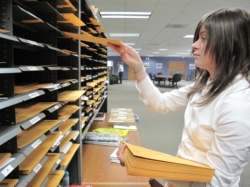Cristo Rey students get education in and out of classroom
BRAINTREE -- Students enrolled in Cristo Rey High Schools learn how to earn. At the same time, they earn to learn.
In the archdiocese, North Cambridge Catholic High School (NCCHS) and Notre Dame High School schools follow the Cristo Rey model of education, a nationwide network of inner-city schools that serve students who live around the poverty line. For five days a month, one day per week and one additional day during the normal school year, students commute to an entry-level job at a local corporation, jobs in which they experience firsthand the discipline and work ethic necessary to be productive and valuable employees in the world of work. The money they earn from these jobs goes directly to the school to offset the cost of tuition.
“It teaches us about responsibility and how we are going to be when we get older,” said Claudaire Jeudy, a freshman at North Cambridge Catholic.
“Our students are not working for an iPod or a new pair of sneakers,” said Celeste Begley, director of Hire4Ed, the work-study program at Notre Dame High School. “They know they are working because they want to come to the school and they want to go to college.”
Jeudy and his peers are required to work the same eight-hour work schedule as everyone else in their positions in companies and non-profit entities in greater Boston, the Merrimack Valley, and even southern New Hampshire, and work alongside CEO’s, department heads, and administrative support personnel.
“They’re treated like any other employee,” said Terry Gupta, Business Development Director for NCCHS’s corporate work-study program. “They can be replaced and fired at any time, like any other employee.”
Gupta and Begley said that corporations pay their respective schools for a team of five students to fill an entry-level position within the organization. Therefore, the position is covered every day.
“It shows them that by working, they make the contribution themselves, in addition to a nominal tuition” said Thomas P. O’Neill, chairman of North Cambridge Catholic’s Board of Trustees and CEO of O’Neill and Associates, an employer of NCCHS students.
North Cambridge’s website lists over 90 companies, including the Archdiocese of Boston, that sponsor students to perform duties such as filing, data entry, answering phones, working the help desk, or other forms of administrative support. Notre Dame, on its website, says that the program currently serves more than 60 employers in the Greater Merrimack Valley area.
At the Pastoral Center in Braintree, NCCHS students work in the mailroom collating mail, assembling large mailings, stamping outgoing mail, delivering packages to archdiocesan employees in the building, and other administrative tasks. They also assist in other departments, including finance and human resources.
While students learn entry-level work, corporations are getting an education as well.
“The educational process is working in reverse,” O’Neill said. “The people they are working with are getting an education too, to know what background these youngsters are coming from.”
Gupta said that companies that hire NCCHS students support a diverse work force and meet social responsibility goals.
“This is more than just giving in a charitable light,” O’Neill added. “They also understand the productivity they would get is as high as a low-paying wage they’d be paying anybody else. For that reason alone, we have many corporations buying one, two, or three teams because they know it’s a good investment.”
Additionally, Gupta said, the cost to a corporation is less than what medium to large companies would pay for administrative support, and students perform valuable work in a recession that is forcing companies to make cutbacks.
Even though students commit five days per month to the corporate world, their academic schedule is just a rigorous as it would be at any other high school. However, the academic schedule is adjusted to fit the realities of employment.
Gupta said students have longer school days because of time spent at work.
At Notre Dame, Begley said students are in school from 8 a.m. to 3:30 p.m., typically one hour longer than the standard American high school schedule. This year, the school year at Notre Dame runs from August 31 to June 23.
In addition, students participate in training during the summer where they learn work skills like team-building, business etiquette, communication, problem-solving, conflict resolution, and confidentiality.
Theresa Mazzarella, a freshman at NCCHS who works at the Archdiocese of Boston, recalls the session on managing emotions at work. She recalls a demonstration of dropping stones on a paper towel, with each stone representing something negative that can happen to a worker.
“You learn how to talk to people about your problems instead of letting it build up,” she said.
Success stories from this model abound in Cambridge and Lawrence.
Gupta said that when the model was implemented, the school had a four-year collegiate acceptance rate of 27-percent. Now, she said, that rate is over 80-percent. The overall college acceptance rate, including two-year schools, is at 100-percent, Gupta added.
Begley credits the students’ work experience for their collegiate acceptances.
“All the students will graduate saying they worked for four different corporations,” she said. “Their resumes look great going into college.”
Once students plunge into the work world, they discover the reality of corporate culture based on personal experiences. Their outlook can be positive, avoiding the negativity that societal stereotypes may have bombarded upon them.
“Before you get into it, it seems boring and miserable,” said Mazzarella. “Once you have to live through it, it’s not so bad. It’s not as bad as people make it out to be.”



















